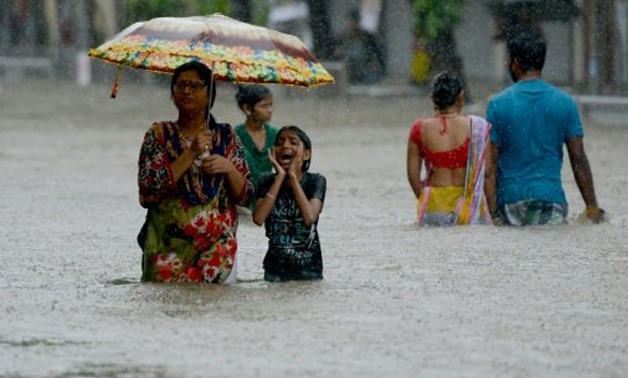
Days of intense monsoon downpours have deluged the densely-populated city of more than 20 million, paralysing crucial local train services and leaving commuters to wade through swirling waist-high waters
AFP / by Vishal MANV
MUMBAI - 30 August 2017: At least five people were killed as heavy monsoon rain deluged India's financial capital Mumbai, causing transport chaos and forcing schools and many offices to close on Wednesday.
The coastal city of more than 20 million people is the latest to be hit by floods that have ravaged South Asia this monsoon season, affecting millions of people across India, Nepal and Bangladesh and killing over 1,200.
Authorities in Mumbai said at least five people had died since the intense rainfall began on Tuesday, making roads impassable and briefly shutting the suburban rail network on which millions of commuters depend.
"Five people have died in the Mumbai floods. Four of them including two children died due to wall collapse in the slums and another person died due to electric shock," Tanaji Kamble, a local government official, told AFP.
Kamble said the rains had eased by Wednesday. "We are monitoring the safety situation across the city and things are returning to normal."
Cars were submerged and commuters waded through waist-deep water on Tuesday evening.
"I could not find any mode of transport and spent my night on the streets instead of trying to reach home," said 62-year-old Gangadin Gupta.
He said many people had been left stranded for much of the night until the rail network reopened early Wednesday.
- Valuables lost -
Residents of Dharavi, one of Asia's biggest slums and home to more than a million people, said much of the low-lying area was under water.
"Most of the shanties and houses in Dharavi were submerged in water and we lost all our valuables," said Selvam Sathya, 45.
"All of us took refuge on the first floor of different buildings and the water only started receding this morning... I lost all my belongings in the flooding."
The transport chaos forced the city's famed dabbawallahs, who take hundreds of thousands of hot lunches from commuters' homes to offices every day, to cancel their delivery.
Many of the more than 5,000 dabbawallahs were left stranded in the city overnight, a spokesman for the Mumbai Dabbawallha Association told the Press Trust of India.
The flooding brought back memories of 2005 when around 950 millimetres (37 inches) of rain fell on Mumbai in just 24 hours, killing more than 1,000 people.
Electricity, water supply, communications networks and public transport were totally shut down during the 2005 catastrophe, which was blamed on unplanned development and poor drainage in the western city.
India, Nepal and Bangladesh all suffer frequent flooding during the monsoon rains which begin in June and last till September or October.
But the Red Cross has termed this year's floods the worst for decades in some parts of the region.
It says entire communities have been cut off and many are short of food and clean water.
The east Indian state of Bihar has been particularly hard hit, with over 500 people killed this monsoon season.
Around 1.7 million people were reportedly affected by the floods, which are now receding.


Comments
Leave a Comment